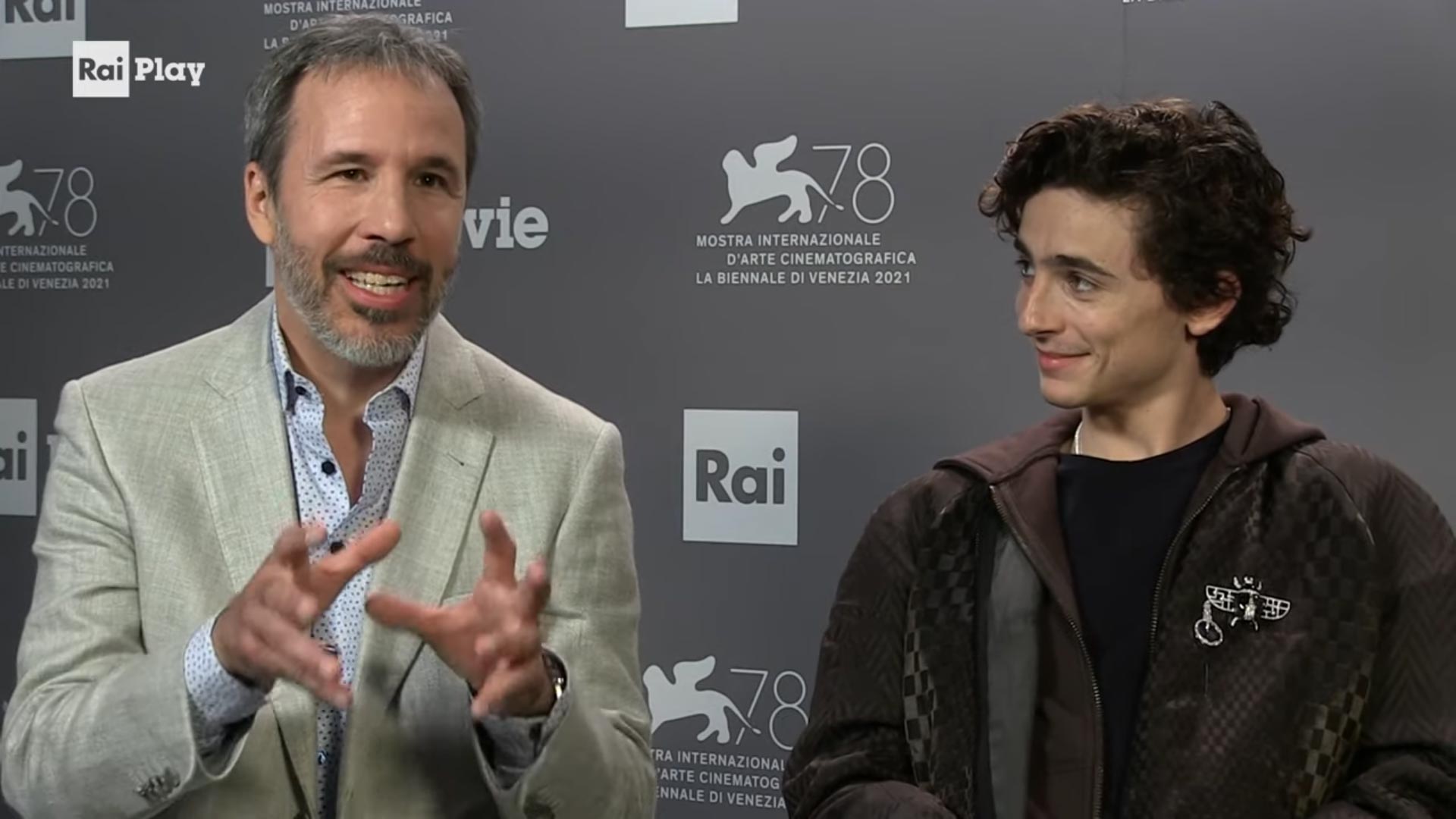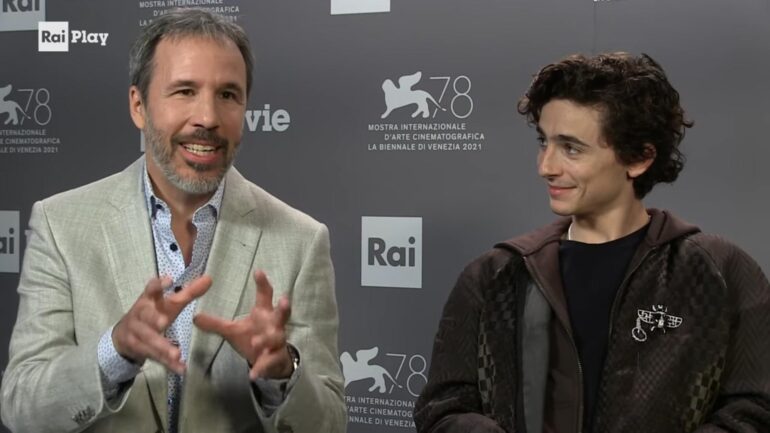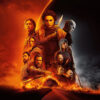
With cast and crew of Dune: Part One in Venice for yesterday’s world premiere, it’s been a field day for media coverage. In addition to the official Venice Film Festival press conference, the director and stars of the 2021 movie have appeared in a succession of interview.
Rai Play posted an insightful video discussion with Denis Villeneuve and Timothée Chalamet together, covering their approach to bringing the main character, Paul Atreides, as well as the rich world of Dune to life, whether it’s the unique forms of communication or practical nature of the sets. The star also reiterates what we’ve heard from his peers—even with the massive scale of the production, the atmosphere on set felt like being with family.
Watch the full interview (9 minutes) here or read the transcript below.
Alberto Farina (Rai Play): First question is, making a movie is always a gamble, but in a way Dune is a gamble twice as much. It opens as Dune: Part One. How does it feel to create a movie that has to stand on its own, but also be an opener for a whole world?
Denis Villeneuve: Yeah we can say it’s a gamble, but I thought that it was a better idea to do that, than to try to compress all that story into one movie.
I like challenges… For me that was part of the game to approach this, this way, and it’s quite… yeah it’s daring, I love it. I love the challenge. For me it was like—but I will say this I kept in my mind as I was doing the movie, in the back of my mind I’m saying, “if it’s the only one I’m putting all my joy and put a lot of it, all my energy into it, like if it was the last movie. Anyway, when you do a movie you always do it like if it was your last movie, so it’s like that’s a way to do things.
AF: The idea of tackling a pre-existing property that’s so popular, that’s been filmed before, that has many fans that are rabid and waiting for Villeneuve version. Was there a pressure on you—on both of you in fact—because you are creating Paul Atreides, but people has their own Paul Atreides in mind. Was that a big pressure, thinking of all the fans that know the book by heart?
Villeneuve: Yes yes yes yes, the thing is that the idea was really to go back to the source material, to the book, and I tried with my team to be as close to the spirit, in fact the good news is that I’m probably among the biggest fan of this book. I love this book since decades, since maybe 40 years, so I mean I am one of this these hardcore fans. So my toughest judge was myself, so that I knew and that was difficult to deal with that judge, I would say, yes.
AF: And what about you?
Timothée Chalamet: I would say less of pressure from the previous iterations—with huge respect for the David Lynch version, the computer game, the sci-fi version—and more pressure from the amalgamation, as you put it, of a projection of Paul that people had. You know, from being a fan of the book or… also because it’s been a while since, for the first time ever perhaps, this sort of technology [is] available to the film too, that an adaptations been able to be done like this. And also, with a master of cinema right now doing it, so I think the art takes place in the head of the audience members, so people will judge for themselves.
AF: An interesting thing about the film is that it conveys a lot of information from the book, without saddling it with exposition and explanation, gives a lot of for granted, but you understand everything. How did you work to preserve the ideas while not explaining them?
Villeneuve: Yeah that was the one of the big challenge, you know it’s a book that contained a lot of background story, very complex cultures colliding together, and to try to preserve as much of the details— the colors, the texture, the depth of the book—still not overwhelming the audience with exposition, that was not done over a weekend. Honestly, it was a long process of writing, of meditating, of dreaming. I would say that the movie got better from the screenplay, to the shooting stage, to the editing room. It’s really a movie that evolved through time as we were making. It’s like, in fact the answer is a lot of work to say!
AF: Some more work is about the language, the way you convey the idea of telepathic communication with the gestures. Was that a nightmare, was that easily solved at the beginning of the project?
Villeneuve: No that was fun to do. That I had a lot of pleasure. I came with—this is an idea that came from the book, but it’s something that gave me access to the strategies, the inner thought of the characters and the strategies. That was just a lot of fun to do, yeah. And it’s a sign language that was designed for the movie, by a language expert in [Los Angeles] that designed all those gestures, so that the actors were studying this new language. Yeah it was a lot of fun, it was amazing.
AF: Yeah, which happened in a way in Arrival, that’s why I was asking.
Something about Paul Atreides; he’s a reluctant leader, he’s not the first idea you get of an action hero, because he becomes a hero, but also when he kills for the first time he has compassion for the person. So how did you work on this character and then how did you choose Timothée for the part well?
Chalamet: I love that contradiction. I’ve never worked on a movie of this size before and I keep saying it, but I just read in a book recently to live in paradox not contradiction. And I feel that’s perhaps the place that Paul gets to by the end of the movie and certainly not at the beginning, and certainly not when he’s on the you know sort of hero / anti-hero journey that he’s launched on after the Gom Jabbar scene.
As far as someone to play, what a gift to be able to play that in a movie of this size and not to play an archetype or some sort of pastiche of a character, but rather play someone who is in deep conflict about the things that every young teenager goes through in some way—but also the pressures that are unique to Paul, unique to the the situation of the Muad’dib, the prophecy of the Bene Gesserit.
With Denis’s sensibilities I don’t want to speak out of turn, but I feel just looking at his other films, he’s as invested if not more invested in character development behavior as he is and all these things that are above my pay grade—the scope of the film, the sets, the sound design, music—so I think it all bled into each other.
AF: And how about your choice of Timothée?
Villeneuve: Yeah that’s always embarrassing for Timothée when I start to talk about that, but I have to say the truth. The thing is that Timothée is one of the best actor of his generation, if not the best, and I needed someone that would have the strong shoulder enough to be able to carry the weight, because we are just above his shoulder for two hours and a half. You know, it’s just like we are, he’s almost in every shot.
Every scene is like is a conveying a very… it’s a simple story, but with a complex character development in the story’s relationship with his mother. I needed a very very very strong actor with a very strong charisma, and someone that Timothée, if I may, is a brilliant young man. I mean it’s a very intelligent, high intelligence in the eyes, and a lot of wisdom for his age. I was always impressed by his intelligence and in the same time he looks tremendously young. So so young on camera, so that was a good combination for—but he is Paul Atreides for me, no Plan B. I had Timothée in mind and I’m so grateful that today we’re here.
Chalamet: Thank you, thank you.
AF: What was it like to act on such a huge scope movie with special effects, after making smaller movies such as the Woody Allen one or Call Me By Your Name, so completely different set I assume?
Chalamet: I must say special effects on this, I think I shot two scenes with a green screen in total on this. These sets were practical, the ornithopter was practical. When we shot in exteriors we were out there in Jordan or Abu Dhabi in the desert. So from that perspective, no difference.
From the perspective of the amount of crew that were there—sometimes numbering the hundreds, sometimes there [were] splinter crews—that becomes like a whole ship. And also the relationship with the director and, after everything that Denis just said in addition to the experience I had, of course my gratitude is in the ten thousand percent to him.
And yet I did have this awareness on set where I thought man, Denis is the chief of like a huge warship right now and he’s not here to worry about me or not even all the actors. It’s also his job, but it’s everything. So I had a huge respect for working with a director for the first time, that wasn’t you know—in respect to Polytechnique and Incendies movies that like the ones you alluded to that are smaller in size—this is a whole different thing.
And, without talking too much I’m sorry, I gotta say on the on the flip of that—if the first couple days felt like that or if some days on set were you the fans and the machines feel enormous—Denis’s creative team is a lot from these other films, so it just felt like stepping into a family, into a carnival. And as Javier said in a different interview today, it felt like an indie film with a big budget, you know indie film on steroids!
Villeneuve: Yes yes yes, I tried to preserve the intimacy with the camera at the beginning, yeah.
Chalamet: Yeah, the whole time. I felt like all the time.
AF: And it shows, thank you very much. See you again for Dune: Part Two.
Source: Rai Play via Alberto Farina (September 3, 2021)



